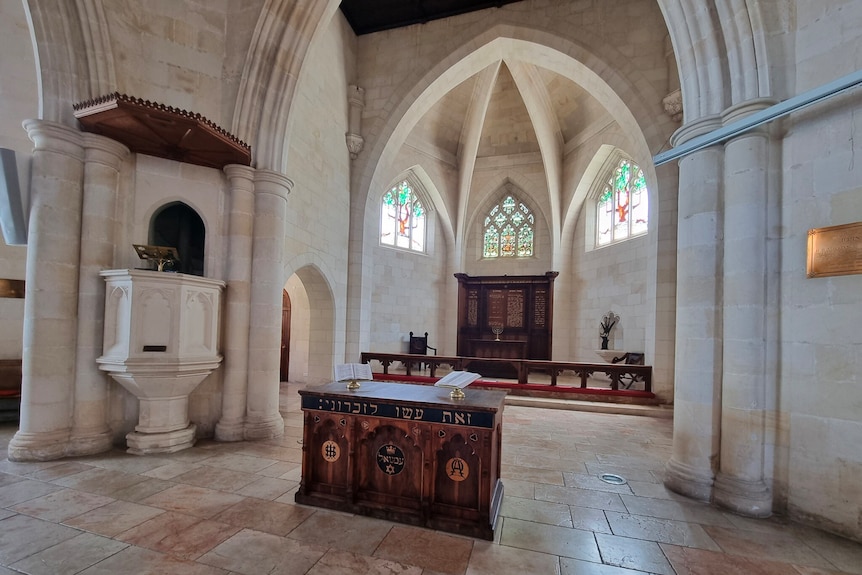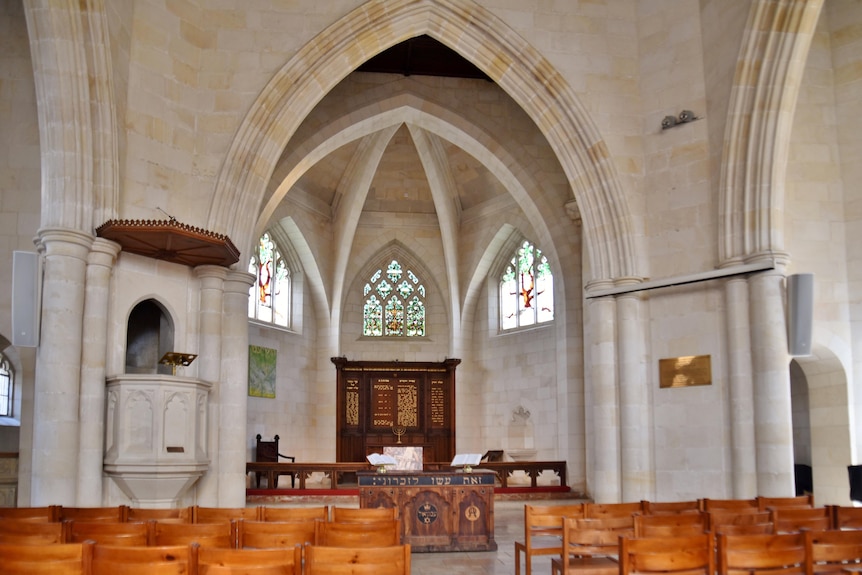This Christmas morning, Reverend David Pileggi will rise early in the old city of Jerusalem where he has lived for the past 43 years. He will, as he has done so many times before, don his clerical garb before walking next door to Christ Church Jerusalem, the oldest Protestant church in the Middle East, to officiate at Christmas services.
What will he say this year? Pileggi could be forgiven for feeling disconsolate in celebrating the birth of the “Prince of Peace”, when peace in the “Holy Land” must feel such a long way off. Some churches in Jerusalem have decided not to celebrate Christmas this year, in honour of all the lives lost and the parlous situation in Israel and Gaza. But Pileggi will push on with his traditional Yuletide practice.
Pileggi and his wife arrived in Jerusalem from the US in 1980, intending to stay for a year or two, but they never left. He immediately felt comfortable in his new surroundings. “I had been raised in an Italian American home. And the culture of my home life was very similar to the lives of Jews and Arabs here,” he says. “So you might say I was prepared in a way for this assignment.”
Speaking to me from his office in the heart of the Old City, Pileggi explains that Christ Church has services in English, Hebrew and Arabic. On Sundays people from around 40 different nationalities attend. Pileggi loves the place and finds it stimulating, faith-building and exhausting.
Building bridges of understanding
A key activity of the church since its inception in 1823 has been to find ways to have Jews and Arabs work together to find common ground.
“We’re always trying to find ways to … build bridges of understanding, but I’m not doing it with a seminar or an abstract philosophical lecture in a classroom. We’re doing it on the ground”, explains Pileggi.
Christ Church’s Mercy Fund serves people in Israel, Gaza and the West Bank. Until the war broke out, they were assisting cancer patients in Gaza to get treatment in Israeli or Palestinian hospitals. They have a team of lawyers — Arab Christians and Jewish Christians — indiscriminately helping poor people in need of assistance in the region.

Pileggi says his life in Israel involves working among “two traumatised populations” with such intractable differences that something more than political solutions is required. He believes a spiritual change in people is both a necessary precursor and real-life possibility on the road to reconciliation and peace. “If we can show mercy and empathy to both sides, then I think there is hope for the future. So I’m not giving up,” he says.
That mercy and empathy for both sides is conspicuously absent in much of the discussion around the current war in Gaza, with hard lines drawn between those who are either “pro-Israel” or “pro-Palestinian”. Israeli writer Etgar Keret spoke to the New York Times about this disturbing dehumanising tendency, saying:
“And when I see people watching the horrible tragedy that is happening here as if it were a Super Bowl of victimhood, in which you support one team and really don’t care about the other, empathy becomes very, very selective. You see only some pain. You don’t want to see other pain.”
The shadow of October 7
But what kind of shadow have the October 7 attacks on Israel and the resulting war in Gaza cast over David Pileggi’s hopes for the future? Pileggi has been in Israel long enough to see plenty of violence and hatred, but he admits recent events have been “shocking to the core”. There has been “so much suffering,” he says.
Dr Salem Jai, a native of Jerusalem, is familiar with that face of suffering. Jai works for World Vision in health and child development, working with the poorest children in the poorest part of the West Bank. He’s a Palestinian Christian — a shrinking group of people frequently forgotten in discussions about the Middle East. He feels a powerful motivation to be a “good Samaritan” in the places where the most vulnerable and marginalised are left without adequate services.
Jai can’t ignore the contrast between the life-giving and faith-inspired hopefulness of his daily work and the malignant violence that surrounds him. “You believe in a living God and that you should live and love people. You should forgive people and you should live in peace and you should seek justice … But you are living in a place where death surrounds you from every side,” he says.
Thinking about Christmas and what it means to him this year in particular, Jai remains remarkably sanguine. He talks about Christmas as a time to reflect, to renew his mind and ponder his blessings and the peace that he says comes only from above. “I’m very safe under his mercy and grace,” he tells me.
Bringing together bitter enemies
This undaunted spirit is in harmony with that of David Pileggi, who admits he can sound like a naive optimist in believing that embodying the message of Christ is the best hope for intractable human conflict.
“The gospel message is that people from all nations and all languages and all cultures should keep their nationality or their ethnicity or their language or their culture, but … instead of killing each other, fighting with each other or always trying to dominate each other, actually can come together in unity.”

That’s a summation of Pileggi’s upcoming Christmas sermon. He views his priestly calling as to work among people who are culturally bitter enemies and find a way to bring them together as one people. That’s what he thinks the Christmas message is all about.
And it’s the story he’ll be telling in the Old City of Jerusalem on Christmas morning. A message of defiant hopefulness. “There’s a way out of this dysfunction and there’s a way out of this morass,” Pileggi says. “There is healing, there is reconciliation, there is wholeness … I think that’s the message of Jesus.”
I don’t know if the old Christmas carol “O Come O Come Emmanuel” will make the list at Pileggi’s church this year, but it would surely be fitting if it did. Full of longing and melancholy and anticipation, it pleads for things we all would wish for, whether believers or not; whether in Jerusalem, Gaza or Parramatta: “O come, Desire of nations, bind All peoples in one heart and mind; Bid envy, strife and quarrels cease; Fill the whole world with heaven’s peace.”
Simon Smart is the executive director of the Centre for Public Christianity.
This article first appeared on ABC News.